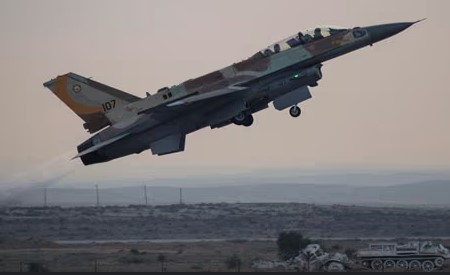IDF Targeting Terrorist Networks
On Friday morning, Israel Defense Forces (IDF) fighter jets launched a significant strike on the Janta crossing, located at the border between Syria and Lebanon. This crossing has been used by terrorist groups, including Hezbollah, to transport weapons across the border from Syria into Lebanon. The IDF’s airstrike aimed to disrupt this flow of weapons and prevent Hezbollah from strengthening its military capabilities. The Janta crossing has been a key location for Hezbollah’s operations, and the recent attack was part of Israel’s ongoing strategy to weaken the group’s ability to launch attacks against Israel.
Hezbollah, a powerful militant group based in Lebanon, has long been involved in various conflicts, including those against Israel. Its support and strengthening have been a concern for Israel, as it often receives weapons and military supplies from different sources, including Syria. By targeting the infrastructure at the border crossing, the IDF is trying to stop this supply chain and ensure that Hezbollah does not become more powerful.
Ongoing Campaign of IDF
The airstrike on the Janta crossing is part of the IDF’s ongoing campaign to weaken Hezbollah’s military capabilities and prevent the transfer of weapons from Syria into Lebanon. These weapons, often intended for Hezbollah and other militant groups, pose a significant threat to Israel’s security. The IDF has previously targeted similar infrastructure to disrupt the flow of advanced weapons to Hezbollah, aiming to weaken the group’s operational strength.
In addition to targeting infrastructure, Israel has focused on eliminating key Hezbollah commanders, thereby weakening the group’s leadership and ability to launch attacks on Israel. These actions are part of Israel’s broader strategy to reduce Hezbollah’s influence and disrupt its efforts to rebuild and reorganize after suffering losses, ultimately aiming to minimize the threat from Hezbollah and other militant organizations in the region.
Hezbollah’s Role and the Strategic Importance of the Border
Hezbollah is a militant group that operates primarily in Lebanon but has extended its influence into Syria as well. It has been involved in many conflicts over the years, and it receives support from countries like Iran and Syria. This support is often in the form of weapons, training, and financial resources. The group’s strategic importance in the region has made it a significant player in conflicts involving Israel.
The border between Syria and Lebanon is an important point for the transfer of weapons and supplies to Hezbollah. Syria has been a key ally of Hezbollah, providing them with weapons and training to carry out military operations. Over the years, Hezbollah has gained substantial military power, including the ability to launch rockets and missiles into Israeli territory. The IDF’s operations aim to weaken this power by cutting off the flow of weapons from Syria into Lebanon.
The region around the Janta crossing is critical for Hezbollah’s logistics and supply chains. The destruction of this infrastructure helps to prevent Hezbollah from easily resupplying its forces and increases the difficulty of its operations against Israel. By attacking these sites, the IDF is making it harder for Hezbollah to maintain its military presence and capabilities, thus reducing the threat to Israeli security.
The Broader Context of Regional Tensions
The situation at the Syria-Lebanon border is part of broader regional tensions that involve Israel, Hezbollah, and its allies, Iran and Syria. Israel has long been concerned about Hezbollah’s growing influence and its military support from these countries, which pose a significant threat to Israel’s security. The IDF is conducting operations, including the recent airstrike on the Janta crossing, to prevent weapons from reaching Hezbollah and disrupt the group’s operations, which could lead to attacks on Israel.
In addition to conducting airstrikes, Israel is focusing on intelligence gathering and surveillance to monitor Hezbollah and other militant groups. These efforts help Israel respond quickly to potential threats and maintain border security. The ongoing conflict with Hezbollah has highlighted the importance of securing borders and preventing weapons smuggling, with the IDF’s targeted strikes continuing as part of Israel’s strategy to weaken Hezbollah’s military capabilities.

